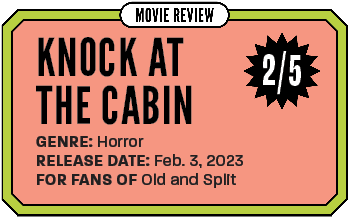‘Knock at the Cabin’ breaks down too many doors

Warning: This review contains spoilers.
Picture breaking into and entering a home — it’s likely that the hypothetical intruder would only need to break one window to get in. So why spend effort on breaking all the windows, the door and every part of the house you can possibly find?
That arduous (and needless) process feels much like M. Night Shyamalan’s latest film “Knock at the Cabin,” adapted from the 2018 novel “The Cabin at the End of the World” by Paul Tremblay, which features a group of four intruders that break into a family’s cabin. These four intruders are Leonard (Dave Bautista), Adriane (Abby Quinn), Sabrina (Nikki Amuka-Bird) and Redmond (Rupert Grint). Yet, each of them are quick to convey that they aren’t just intruders; They’re instead the chosen ones, tasked with delivering a critical message by virtue of the visions they’ve received from an otherworldly force.
Once they’ve broken inside the cabin, the four demand that either Andrew (Ben Aldridge), Eric (Jonathan Groff) or their daughter, Wen (Kristen Cui), sacrifice themselves to stop the apocalypse. Every time the family doesn’t make a decision, one member of the intruder group will be killed by the other members.
It’s a clever premise that ends up becoming rather formulaic, as each member of the group dies in succession throughout the film through a series of bloody battles and escape attempts. “Knock at the Cabin” should instead be called “Multiple Deaths at the Cabin” as the story is basically that. Moreover, Eric decides to sacrifice himself at the end, giving off the impression that the four deaths before were all in vain. If only Eric would have decided that earlier, then all of the backstories would have felt more integral.
Even as the film structures itself around these repetitive deaths, the story seems fixated on humanizing all of the characters involved. Humanization is always a compelling idea, but here it feels strained and shoveled in, much like the mantra that the group members repeat every time one of them dies.
Everyone involved carries out an impressive performance, with the real standout being Bautista. Bautista looms as the leading presence, while still receiving enough screen time to show that he’s only doing this to the family because he cares.
Despite that, the film seems to think that there can’t be a villain in this story. As a result of that, it tries to include every character’s context, verbalized through each member of the group.
While the goal was likely to make each character’s death more impactful, the additions feel exhausting when the characters die shortly afterwards before the audience gets fully invested. Shyamalan inserts various flashbacks of Andrew and Eric throughout their imprisonment in the cabin. These flashbacks usually depict Eric and Andrew being happy parents to do … what? Make audiences sympathize with them? Show the stakes involved? These flashbacks, while touching, don’t exactly move the story forward other than explain the backstory of the relationship, which drags the urgency of the present life-and-death situation.
There’s something in there about Redmond being the man who attacked Andrew in a bar out of homophobia, but the implications of that aren’t clear when it comes to moving the plot forward. In effect, that point ends up confusing audiences.
The issue here is with the stakes. The group members aren’t allowed to kill members of the family, so as heartless and cruel it is to think about it, the family could merely sit back, be patient and let each stranger die on their own before going free. An escape doesn’t feel necessary, so it’s questionable why the family wastes so much time and energy trying for one.
Perhaps the filmmakers checked off “high stakes” in the process of making this film. After all, nothing could be more at stake than the fate of humanity, a consequence that shatters all the windows, conveniently forgetting that someone only needs to break open one door to enter.
“Knock at the Cabin” literally knocks down multiple entrances of the cabin for each member of the group when it could have focused on just one core element. The film needlessly presents each character’s backstory, includes the unnecessary hint of homophobia and doesn’t answer the question of why the sacrifice and violence is necessary. All these arcs proceed in a suffocating fashion, just like the cabin suffocates the family. Upon further thought, it’s no wonder they wanted to leave.

